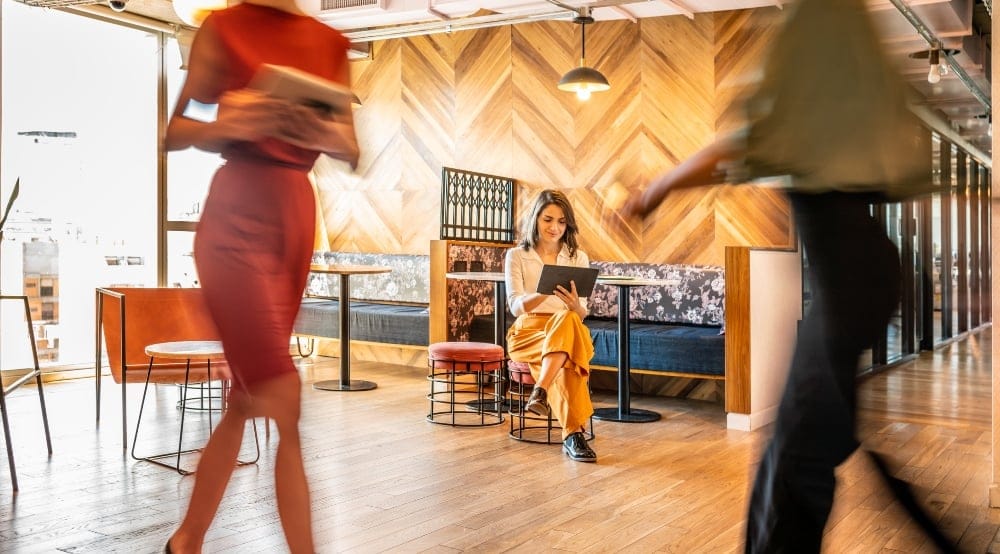
Let us help you with finding an office space
Our experts are here to help take the hard work out of finding your next office space.

In the wake of the coronavirus pandemic, the world of office space has been pushed under the microscope. Some businesses have debated the permanence of WFH, others have begun to set new workplace strategies, but all have had to balance cost, productivity and wellbeing under the fog of uncertainty.
If there’s anyone who has followed this journey closest, it’s Knight Frank’s experts. By helping businesses navigate the world of office space every day, they know what businesses are most worried about, what their new priorities are and what’s pulling them back to their offices.
To understand how businesses are feeling, we caught up with Francesca Cooper-Isow and Tom Walsh from Knight Frank’s Flexible Office Solutions team, Julian Woolgar and Jack Tomlin from Knight Frank’s London Tenant Representation team and Joanna Dixon from Knight Frank’s Strategic Consulting team.
Woolgar: In the early days, the biggest concern for many was public transport – it was the journey into the office rather than being in the office itself that made people nervous. But workspaces are more controlled environments, full of precautions and rules to mitigate risks.
Cooper-Isow: Yeah, a lot of businesses have asked us about Covid-secure features in flexible offices, and they are quick to be reassured by all the measures flexible office providers have put into place.
Walsh: I’m finding that smaller businesses, in particular, are being cautious with their finances. To alleviate that concern, some are turning to flexible offices because of their monthly-rolling contracts, all-inclusive costs and quick-to-leave terms.
Get your monthly dose of workplace insights, productivity hacks and business leadership ideas - delivered straight to your inbox.
 "People want to be with people. Offices provide experience, connection and choice – they fire up your creativity and give you an environment you just can’t get at home." - Joanna Dixon, Workplace Consultant, Strategic Consulting.
"People want to be with people. Offices provide experience, connection and choice – they fire up your creativity and give you an environment you just can’t get at home." - Joanna Dixon, Workplace Consultant, Strategic Consulting.
Woolgar: I don’t think we’ve seen changes per say, I think we’ve seen the acceleration of certain trends, such as shorter leases, flexibility, an interest in building technology, facilities that accommodate active commuting (like bike racks and showers) and sustainability in buildings.
Tomlin: It’s true. This has been a catalyst of sorts. Before Covid-19, we started to see an uptick in agile working, for example, but even then, having 100 people sharing 60 desks might have been a step too far, whereas now that’s just expected.
Dixon: I agree – agile working re-imagines what the workplace can offer. That’s why office space that can be easily transformed to accommodate larger, whole team (or cross-team) get-togethers, as well as small groups collaborating alongside drop-in work settings, is what businesses are looking for now.
Cooper-Isow: I think part of that comes down to choice. Businesses are giving employees the autonomy to choose where they work and how they work, with the office being one of those options because they feel it’s important for everyone to have a base to collaborate in.
Walsh: There also seems to be no ‘one-size-fits-all’. Some clients are looking to downsize and operate on a rota system, whereas others want a larger office so they can welcome everyone back under the same roof at a lower density.
 "As soon as we start to see green shoots of recovery and businesses have to compete for talent again, not having an office might force you to lose out on the best candidates." - Jack Tomlin, Partner, London Tenant Representation Team.
"As soon as we start to see green shoots of recovery and businesses have to compete for talent again, not having an office might force you to lose out on the best candidates." - Jack Tomlin, Partner, London Tenant Representation Team.
Dixon: As was said in one of the many debates currently taking place on the future of the office, people want to be with people. Offices provide experience, connection and choice – they fire up your creativity and give you an environment you just can’t get at home or in a coffee shop or even in a local library.
Tomlin: That’s right. There is a recognition now that the office can’t just be what it’s always been, it needs to be a destination that people are happy to invest commuting time into – with ground floor coffee shops and curated meet-ups to establish a sense of community and belonging.
Walsh: I think beyond the appeal of socialising, businesses have been lured in by office contracts that offer multi-site access. If a flexible office membership gives each employee the freedom to choose where to work – be it Victoria, South Bank or Shoreditch – businesses can embrace flexible working, shorten commuting times and maintain a work-life balance. That’s been a win for many.
Cooper-Isow: But also, considering budget is a concern for some, businesses are racing to take advantage of current discounts. I recently had a client sign an office lease just because the price was so good, even though they weren’t ready to move in yet. They just wanted to lock in the deal.
 "There are careers that rely on building networks and client bases, and even with the best technology in the world, that can’t be learned in a remote environment." - Julian Woolgar, Partner, London Tenant Representation.
"There are careers that rely on building networks and client bases, and even with the best technology in the world, that can’t be learned in a remote environment." - Julian Woolgar, Partner, London Tenant Representation.
Walsh: It’s funny, so many businesses have moved away from the ‘we don’t need an office’ mentality, especially since hiring has started to pick back up. Exclusively working from home is no way to retain team cohesion or get to know new joiners, and it can drive a significant rise in loneliness and isolation.
Cooper-Isow: Yeah. I’m seeing that shift too. I think businesses are moving away from knee-jerk reactions and are really starting to examine what they need. Ultimately, the office isn’t a cost, it’s a way to invest in staff, wellbeing, retention and productivity, and that’s certainly the case for businesses that are thinking long-term.
Woolgar: Exactly. There are so many professions that require learning by osmosis; collision encounters or overhearing chance conversations add so much colour to employee development. There are careers that rely on building networks and client bases, and even with the best technology in the world, that can’t be learned in a remote environment.
Tomlin: And actually, it’s been an employers’ job market for the last six months. As soon as we start to see green shoots of recovery and businesses have to compete for talent again, not having an office might force you to lose out on the best candidates; it signals that you have no aspiration to nurture the best people in the best environment.
Ask us to start your office search

Our experts are here to help take the hard work out of finding your next office space.